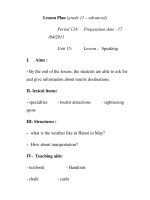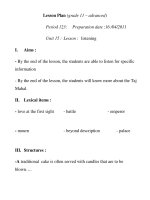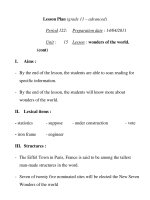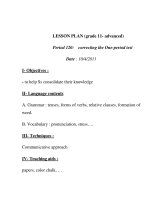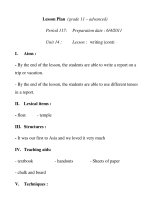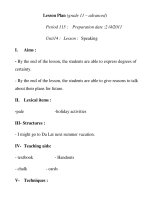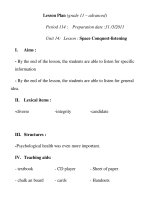Lesson Plan (grade 11 – advanced) Period 115 pptx
Bạn đang xem bản rút gọn của tài liệu. Xem và tải ngay bản đầy đủ của tài liệu tại đây (21.26 KB, 7 trang )
Lesson Plan (grade 11 – advanced)
Period 115 : Preparation date :2 /4/2011
Unit14 : Lesson : Speaking
I. Aims :
- By the end of the lesson, the students are able to express degrees of
certainty.
- By the end of the lesson, the students are able to give reasons to talk
about their plans for future.
II. Lexical items :
-pale -holiday activities
III- Structures :
- I might go to Da Lat next summer vacation.
IV- Teaching aids:
- textbook - Handouts
- chalk - cards
V- Techniques :
- skill-based ( listening, speaking)
VI- Procedures :
State/ti
me
Teacher’s and students’ activities Blackboard Mater
ials
1.
warm-
up
(7’)
Games: Flashing the Pictures
-Arrange SS to work in tow groups, A
and B
-Flash a picture quickly and ask SS to
say what it is ( Appendix 1a)
- With a correct sentence about the
picture, the group scores one point. The
group with more point wins the game.
-Keep a running total of points for each
group on the board.
-Declare the winner
-Ask SS ‘why is the baby crying?’
-If the answer is ‘He is hungry/…’ ask
-
Hando
uts
SS how they know that.
-Ask SS what to use when they just
guess, but not sure of something.
( Add a clock to the picture to show
time in order to elicit more answers
with high degree of certainty like ‘He
must be…’.) ( Appendix 1b)
-
( expected: May be/Perhaps he’s
hungry. /He might be thirsty. /He must
be sleepy. / …)
Transition : -So when we are not sure of
something, we can only tell the
possibility. Today we will practice
expressing possibility through different
degrees of certainty
-Write down on the board :
Unit 14 :
Speaking –
Talking
about
Possibility
2. Pre-
Speaki
ng
(7’)
1.Eliciting and Introducing useful
language
-Make questions to elicit and then
introduce the language used to express
possibility.
-Draw a continuum to show the degree
of certainty the modals express.
Degrees of Certainty
Low degree high degree
( Less Certain) (More Certain)
Modals: may should must
Might can’t
Could ( sure or almost sure)
Adverbs: maybe
perhaps
Chalk
and
board
3.
while-
Activity 1: talking about the
Speaki
ng.
(23’)
situation(tack a, p. 195)
-Ask SS to work in pairs, read the
situations and make a sentence using a
suitable modal to express possibility.
-Go around to monitor and give help if
necessary.
-Call on pairs of SS to act out the
exchanges for the situations
-Give feedback and comments.
Activity 2: talking about the pictures
-Ask SS to work in pairs
-Give each pair a set of
pictures(Appendix 2)
-Tell SS to study the pictures and talk
about what might happen in each case
using suitable modals to express the
degrees of certainty.
-Show are picture and modals an
Textbo
ok
4. Post-
Speaki
ng
exchange to give SS an example.
-Go around to monitor unobtrusively.
- Call on SS to talk about the pictures
and invite the class to express their
opinion and to give comments.
-Give feedback and comments.
Activity 3: talking about plans for
next summer vacation (task b, p.196)
-Arrange SS to work in small groups.
-Ask SS in their groups to talk about
what they plan to do next summer
vacation. Tell them to use the model the
example exchange.
-Have SS do the task.
-Go around to check and give help if
necessary.
-Call on some students to report about
their groups.
Textbo
ok
(7’)
5.
Home
work
(1’)
-Give feedback and comments.
Writing about your plans
-Tell SS to write a few sentences about
what they might do next summer
vacation.
- Ask SS to form small groups of 4 or 5,
exchange their writings for correction
and share ideas.
- give feedback and comments
What’s in common?
-Ask SS to write a short paragraph
about their group or class plans for the
next vacation, beginning with:
Most of us in the group / class are not
sure of what to do in the next summer
vacation. Some might…
Hando
ut
